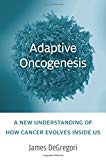
Adaptive Oncogenesis : A New Understanding of How Cancer Evolves inside Us PDF
271 Pages·2018·16.5138 MB·other
Most books are stored in the elastic cloud where traffic is expensive. For this reason, we have a limit on daily download.
Preview Adaptive Oncogenesis : A New Understanding of How Cancer Evolves inside Us
Description:
Popular understanding holds that genetic changes create cancer. James DeGregori uses evolutionary principles to propose a new way of thinking about cancerÕs occurrence. Cancer is as much a disease of evolution as it is of mutation, one in which mutated cells outcompete healthy cells in the ecosystem of the bodyÕs tissues. His theory ties cancerÕs progression, or lack thereof, to evolved strategies to maximize reproductive success. Through natural selection, humans evolved genetic programs to maintain bodily health for as long as necessary to increase the odds of passing on our genesÑbut not much longer. These mechanisms engender a tissue environment that favors normal stem cells over precancerous ones. Healthy tissues thwart cancer cellsÕ ability to outcompete their precancerous rivals. But as our tissues age or accumulate damage from exposures such as smoking, normal stem cells find themselves less optimized to their ecosystem. Cancer-causing mutations can now help cells adapt to these altered tissue environments, and thus outcompete normal cells. Just as changes in a speciesÕ habitat favor the evolution of new species, changes in tissue environments favor the growth of cancerous cells. DeGregoriÕs perspective goes far in explaining who gets cancer, when it appears, and why. While we cannot avoid mutations, it may be possible to sustain our tissuesÕ natural and effective system of defense, even in the face of aging or harmful exposures. For those interested in learning how cancers arise within the human body, the insights in Adaptive Oncogenesis offer a compelling perspective.
See more
The list of books you might like
Most books are stored in the elastic cloud where traffic is expensive. For this reason, we have a limit on daily download.
